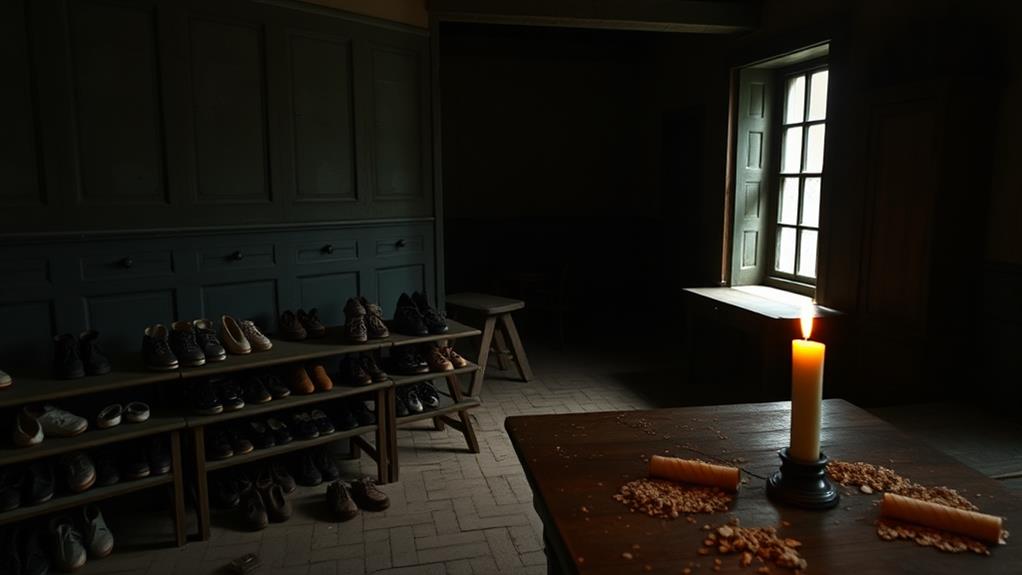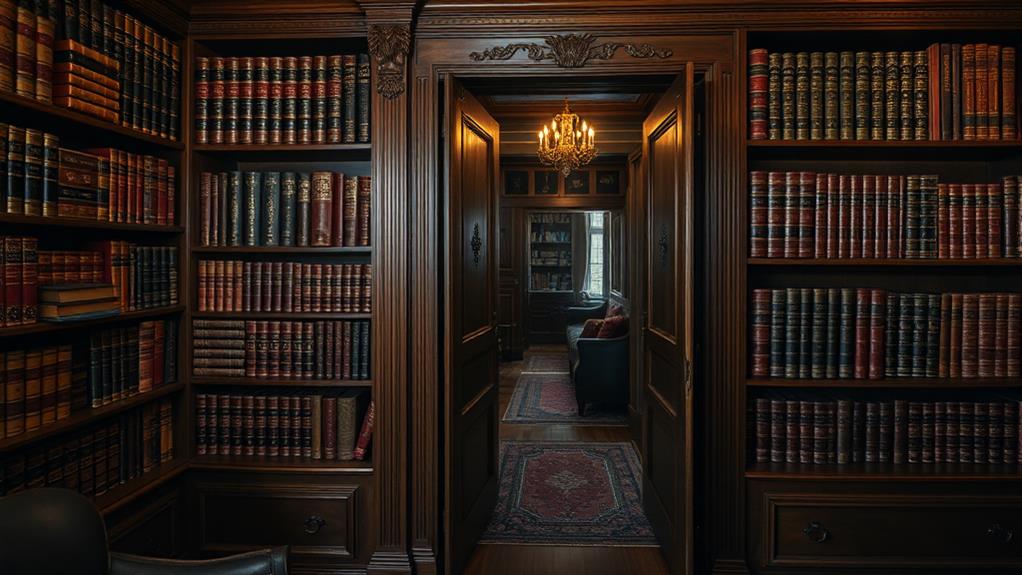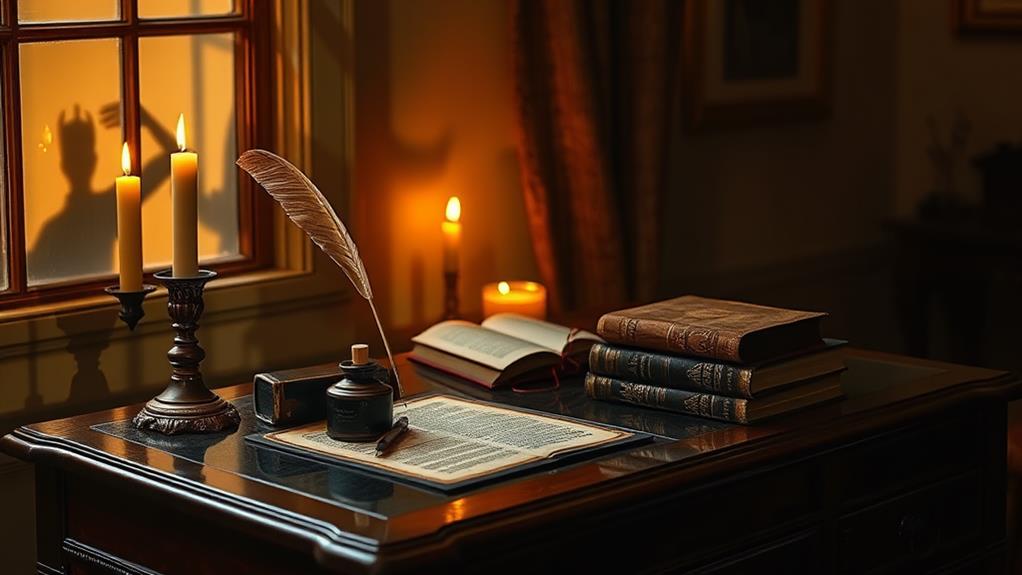Interesting Facts About Charles Dickens You Never Knew
You might think you know Charles Dickens, but there's more to this literary giant than meets the eye. Did you know he had a secret bookcase door in his home, blending whimsy with practicality? Dickens was also a founding member of The Ghost Club, earning him the nickname "Ghost Man of Literature." He coined phrases like "butter-fingers" and "flummox," shaping the English language we use today. Beyond writing, Dickens co-founded Urania Cottage, helping vulnerable women through education and support. His global celebrity status was unprecedented, with his serialized novels skyrocketing in circulation. These lesser-known facts reveal a complex figure who influenced more than just literature.
This post may contain affiliate links. If you make a purchase through these links, I may earn a commission at no additional cost to you. Additionally, portions of this post may be generated using artificial intelligence (AI) technology. While we strive for accuracy, please be aware that AI-generated content may not always be perfect and should be fact-checked when necessary.
The Spatula Scoops
- Dickens coined several common phrases like "butter-fingers," "flummox," and popularized "devil-may-care" through his writings.
- He was a founding member of The Ghost Club and earned the nickname "Ghost Man of Literature" for his paranormal interests.
- Dickens co-founded Urania Cottage to provide education and support for reformed sex workers, eschewing religious teachings.
- His serialized novel "The Pickwick Papers" skyrocketed from 400 to 40,000 in circulation, showcasing his immense popularity.
- Dickens designed a secret door disguised as a bookcase in his Gads Hill residence, reflecting his whimsical personality.
Dickens' Childhood Struggles

Plunged into poverty from an early age, Charles Dickens faced a childhood marked by hardship and struggle. You might be surprised to learn that the famous author's early life was far from comfortable. Dickens' family was constantly on the move, trying to escape creditors due to his father's mounting debts. The situation worsened when his father, John Dickens, was imprisoned for debt in 1824.
At just 12 years old, young Charles was forced to work at Warren's Blacking Warehouse, earning a meager six shillings a week. This experience exposed him to the harsh realities of child labor and social injustice, themes that would later become central to his novels. The impact of these childhood struggles is evident in works like "Oliver Twist" and "Great Expectations," where Dickens vividly portrays the plight of impoverished children and the inequalities of Victorian society.
These formative years shaped Dickens' worldview and writing style, allowing him to create compelling narratives that resonated with readers and shed light on the often-overlooked issues of his time. His personal experiences with poverty and hardship lent authenticity to his stories, making them powerful tools for social commentary.
Secret Bookcase Door

While Dickens' early struggles shaped his literary voice, his later success allowed him to indulge in creative home design. You might be surprised to learn that the famous author had a secret door in his Gads Hill residence, disguised as a bookcase. This intriguing living space feature perfectly reflected Dickens' whimsical personality and love for the written word.
The secret door, adorned with fake books and volumes, served as a private escape for Dickens. It allowed him to maintain a sense of seclusion in his personal life, despite his lively public persona. This playful architectural design blended literary elements with functionality, creating a unique space that symbolized Dickens' appreciation for literature and creativity.
Dickens' secret bookcase door remains a hallmark of his imaginative spirit and unique character. It showcases how his creativity extended beyond his writing, influencing his home environment as well. This clever design choice not only added an element of mystery to his residence but also provided a practical solution for privacy, demonstrating Dickens' ability to infuse creativity into every aspect of his life.
Fascination With the Paranormal

You might be surprised to learn that Charles Dickens was a founding member of The Ghost Club, an organization dedicated to exploring supernatural phenomena. His fascination with the paranormal didn't just stop at membership; he actively incorporated ghostly elements into many of his stories, most famously in "A Christmas Carol." Dickens' interest in the spectral world deeply influenced his writing, helping him create haunting narratives that continue to captivate readers to this day.
Ghost Club Founding Member
Charles Dickens, renowned for his literary masterpieces, had a lesser-known passion for the paranormal. You might be surprised to learn that he was a founding member of The Ghost Club, a society dedicated to investigating supernatural phenomena. This fascination with the otherworldly greatly influenced his writing, as you can see in works like "A Christmas Carol," where ghosts play a central role in conveying moral messages.
Dickens's interest in the paranormal wasn't just a passing fancy. He actively participated in ghost-hunting events and often wrote about his supernatural experiences. This earned him the nickname "Ghost Man of Literature." In his writing, you'll notice how he skillfully blended realism with gothic elements, creating stories that were both grounded and mysterious.
The author's fascination with the supernatural reflected his broader curiosity about life's enigmas. He used paranormal themes to explore complex human experiences and social issues. By incorporating these elements into his narratives, Dickens created a unique style that captivated readers and continues to intrigue audiences today.
Supernatural Story Elements
Throughout his career, Dickens skillfully wove supernatural elements into his stories, enchanting readers with ghostly encounters and eerie phenomena. You might be surprised to learn that Charles Dickens was known as the "Ghost Man of Literature" among his contemporaries, a title he earned through his fascination with the paranormal. This interest wasn't just a passing fancy; it deeply influenced his literary works, most famously in "A Christmas Carol," where spirits like the Ghost of Christmas Past play pivotal roles.
Dickens' involvement with the Ghost Club, an organization dedicated to investigating paranormal phenomena, further fueled his supernatural storytelling. His childhood experiences, steeped in ghost stories and legends, laid the foundation for this lifelong fascination. As you read his works, you'll notice how Dickens uses haunting elements to explore themes of redemption and morality, adding depth to his narratives. These supernatural story elements weren't mere plot devices; they served as powerful tools for Dickens to examine the human condition through an otherworldly lens, engaging readers and leaving a lasting impact on literature.
Linguistic Innovations

You might be surprised to learn that Charles Dickens wasn't just a master storyteller, but also a linguistic innovator. He coined new words and phrases, such as "butter-fingers" and "flummox," which have become part of everyday English vocabulary. Dickens also had a knack for popularizing existing expressions, giving them new life through his widely-read novels and serialized stories.
Neologisms and Coined Terms
Among Dickens' many talents, his gift for linguistic innovation stands out. As you explore interesting facts about Charles Dickens, you'll discover that he was more than just a popular novelist; he was a master of creative vocabulary. His neologisms and coined terms have become an integral part of the English language, reflecting his keen observation of social behavior.
Here's a table showcasing some of Dickens' linguistic innovations:
| Term | Meaning |
|---|---|
| Butter-fingers | Clumsy person |
| Flummox | Confuse or perplex |
| Dustbin | Trash container |
| Ugsome | Disgusting or loathsome |
| Slangular | Relating to or using slang |
You'll find that Dickens' phrases like "devil-may-care" first appeared in his widely read works, particularly "The Pickwick Papers." His inventive use of language not only enriched his narratives but also inspired subsequent generations of writers. This linguistic creativity has proven to be a significant contribution to the evolution of English literature, demonstrating how a skilled wordsmith can shape the very fabric of language.
Popularizing Existing Expressions
Beyond coining new terms, Charles Dickens excelled at popularizing existing expressions, breathing new life into familiar phrases. You've likely encountered "devil-may-care" in everyday speech, but did you know it gained widespread use through Dickens' early work, "The Pickwick Papers"? This creative linguistic innovation is just one example of how Dickens shaped modern English.
Dickens' talent for popularizing expressions went hand-in-hand with his vivid characterizations and engaging narratives. By incorporating these phrases into his stories, he enhanced their emotional depth and made them more relatable to readers. This approach not only reflected the vernacular of his time but also greatly influenced the evolution of 19th-century literature.
As you explore Dickens' works, you'll notice how his use of colloquial language and inventive expressions helped shape the voice of an entire literary era. His ability to breathe new life into existing phrases demonstrates the power of effective writing in content creation. By employing familiar expressions in novel ways, Dickens created a lasting impact on literary style and communication that continues to resonate today.
Unexpected Philanthropic Efforts

Charles Dickens, renowned for his literary masterpieces, also made significant and unexpected contributions to philanthropic efforts. You might be surprised to learn that in 1847, he co-founded Urania Cottage with Angela Burdett-Coutts. This refuge provided education and support for about 100 vulnerable women, including reformed sex workers.
Dickens's commitment to social reform went beyond writing. He personally visited prisons and workhouses to identify women in need of assistance for Urania Cottage. His approach focused on empowering women through education and skills training, rather than religious preaching.
You'll find that Dickens's philanthropic efforts extended to fundraising as well. He utilized his fame by conducting public readings of his works to raise money for various charitable causes. These events not only entertained audiences but also advocated for systemic change.
Through his writings, Dickens highlighted social injustices, particularly poverty and child labor. This encouraged readers to engage in charitable acts and consider the plight of marginalized groups. His literary works became powerful tools for raising awareness and inspiring action among his audience.
Did Charles Dickens Write Any Books with Lesser-Known Fascinating Facts?
Charles Dickens, celebrated for his classics, also penned works filled with fascinating details that often go unnoticed. “The Chimes” and “Hard Times” are prime examples brimming with social commentary. For enthusiasts seeking “interesting facts about books you missed,” his intricate character developments and lesser-known tales reveal a treasure trove of discoveries.
Global Celebrity Status

A true literary rock star of his time, Charles Dickens achieved unprecedented global celebrity status. His fame skyrocketed between 1837 and his death in 1870, making him the first modern literature superstar. You might be surprised to learn how Dickens' popularity soared:
- His serialized novels, like *The Pickwick Papers*, saw monthly circulation numbers jump from 400 to 40,000 copies.
- Dickens' reading tours, especially in the USA, drew massive crowds, with fans often mobbing him.
- The public turnout for his funeral was staggering, showcasing the deep admiration he'd garnered.
- His influence extended beyond literature, impacting theater and modern media adaptations.
Dickens' international appeal was undeniable. His works resonated with readers across borders, cementing his status as a cultural icon. You'd have found his name on everyone's lips, much like today's celebrities. This global recognition wasn't just fleeting; it continued posthumously, with his literary contributions celebrated worldwide. Dickens' ability to capture the public's imagination through his writing and personal appearances solidified his place as a true global celebrity, a feat rarely achieved by authors of his time.
Frequently Asked Questions
What Is an Unusual Fact About Charles Dickens?
You might think you know Charles Dickens, but here's a twist worthy of his tales: he had a secret door disguised as a bookcase in his home. This whimsical feature showcases Dickens' creativity beyond the page. It's not just about hidden passages; it's a glimpse into his playful personality. Imagine the author of "Great Expectations" slipping through this clever contraption, perhaps to find a quiet writing spot or to entertain guests. It's a tangible example of Dickens' imaginative spirit.
What Is Special About Dickens?
You'll find that Charles Dickens was truly special in many ways. He revolutionized storytelling with his serialized novels, making literature more accessible to the masses. His commitment to social reform led him to establish Urania Cottage, a refuge for vulnerable women. Dickens' ability to craft engaging narratives with supernatural elements, like in "A Christmas Carol," showcased his versatility. As an editor and mentor, he supported emerging writers, particularly women, fostering a vibrant literary community during his time.
What Was Charles Dickens Last Words?
Have you ever wondered about the final words of a literary giant? Charles Dickens' last words were reportedly "On the ground." He uttered these words as he collapsed from a stroke in his home on June 8, 1870. You might find it poignant that such a prolific writer's final statement was so brief. Dickens had been in poor health for some time, and these words reflected his sudden realization of his dire situation. He didn't regain consciousness after this collapse.
What Is Charles Dickens' Favourite Color?
Charles Dickens' favorite color was blue. You'll find that this preference influenced various aspects of his life. He often wore blue during his public readings, making it a signature part of his appearance. In his writing spaces, you'd likely have seen blue wallpaper adorning the walls. This fondness for blue contrasted intriguingly with the darker themes in his literary works. Dickens' color choice played a role in shaping his public image and personal aesthetic.





